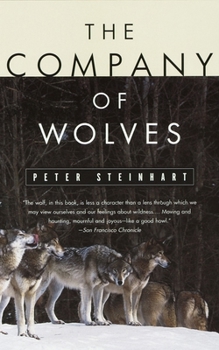The Company of Wolves
Select Format
Select Condition 
Book Overview
As wolves return to their old territory in Yellowstone National Park, their presence is reawakening passions as ancient as their tangled relations with human beings. This authoritative and eloquent book coaxes the wolf out from its camouflage of myth and reveals the depth of its kinship with humanity, which shares this animal's complex complex social organization, intense family ties, and predatory streak.
Format:Paperback
Language:English
ISBN:0679743871
ISBN13:9780679743873
Release Date:June 1996
Publisher:Knopf Doubleday Publishing Group
Length:400 Pages
Weight:0.87 lbs.
Dimensions:0.9" x 5.2" x 8.0"
Customer Reviews
5 ratings
An intriguing and important read
Published by Thriftbooks.com User , 15 years ago
This non-fiction book deals with the conflicts between humans and wolves, the ecology and false mythology of wolves, and how we're preventing their extinction. Steinhart perfectly gives us both sides of all arguments, and there is very little bias found in the overall work. The facts are almost overwhelming, seeing how many people are willing to either love these mammals or kill them for what they're worth. Even as an admirer of wolves, I can still see that the reasons why people despise them are fairly understandable: saving livestock, protecting their homes, etc. But still, it's sad that wolves are an endangered species.
Another Wolf Classic
Published by Thriftbooks.com User , 17 years ago
I found this book picked up where Barry Lopez (Of wolves and men) left off and continues to confront the very real opposition agianst wolves, ranchers and trappers. It also has some wolf adovactes and wolf researchers who argue on the wolf`s behalf. This book is loaded with tons of great information and paints a clear picture of the wolf debate. The only thing I found that was annoying is that, once agian, the book covered mostly american issues. It would have been great if it had covered some canadian and world issues instead of focusing on american wolves.
The Company of Wolves
Published by Thriftbooks.com User , 18 years ago
Steinhart examines many aspects of wolf conservation and controversy in a thought-provoking book. Although this book is slightly dated, having been written before wolves were reintroduced to Yellowstone, I still think it is very much worth reading. It examines controversial issues from various perspectives without demonizing or whitewashing any of them, letting the reader form conclusions -- or come to the conclusion that solutions are not easy after all. It is one of the only nature writing books I've read that discusses the sociological and anthropological aspects of conservation, and the moral issues that complicate our relationships with predators, and it does this in a clear, rational, unsentimental way. Some of the ideologies presented here will be disturbing to readers -- I had never encountered the belief that wildlife is a "resource" to be "harvested" as people see fit -- but Steinhart presents his informants in a fair light, I think. Chapters on the purity or not of red wolves (on which Steinhart suggests what I think is a rational conclusion regarding the mutability of species as they evolve) and on the dangers of wolf-dog hybrids add interesting material that isn't covered in most books on wolves.
Good introduction to wolves
Published by Thriftbooks.com User , 19 years ago
This book discusses the world of wolves and their relations with people. It makes a great introduction to the subject. Though most of the material will be familiar to the dedicated wolf-freak, even she will learn some new things here. Steinhardt writes well, and the book is as much a page-turner as a nonfiction book can be. Each chapter combines a particular theme with Steinhardt's discussions of some person relevant to that theme. For example, the chapter on howling focuses on Algonquin Provincial Park and its summer wolf howls, built around discussions with John Theberge, who started researched Algonquin's wolves by howling at them. The most amusing of these subject-and-person pairings is the chapter on wolf pack social organization, in which David Mech is characterized as the alpha male of wolf research. Each chapter also includes some musings on the meaning of wolves for humans. Why do we hunt? Why do we react to the howl as we do? Why do some people breed wolf-dog hybrids? Some of these musings posed interesting questions but I didn't find any of Steinhardt's comments on them particularly insightful. Steinhardt is clearly on the side of the wolves, and I suspect that most of his readers are, too. Still, he makes an effort to discuss both sides of the issue. Ranchers and even a retired wolf-bounty hunter find sympathetic portrayals here. The book's overall lack of depth would be my only significant criticism. To learn more, dig into the "further reading" that Steinhardt provides at the end.
A kaleidescope of views about wolves
Published by Thriftbooks.com User , 28 years ago
Peter Steinhart's book is a kaleidescopic view of the status of wolves today. There is everything in it from views on the reintroduction of wolves to Yellowstone Park to the controversial scientific status of the red wolf. Though Steinhart is sympathetic to the idea of having wolves in the wild, he deliberately takes a many-sided view, and tries to understand the motivations of wolf lovers, wolf haters, and researchers of all stripes. For city slickers like me, this is an invaluable way to introduce one to complex issues of animal v. human and the various environmental v. job claims which often dog species or habitat recovery issues. For this reason, I highly recommend that anyone interested in ANY environmental issues read this book, whether or not wolves are of interest to them





